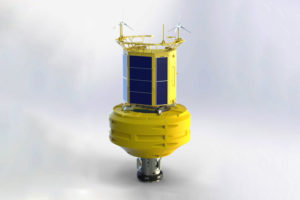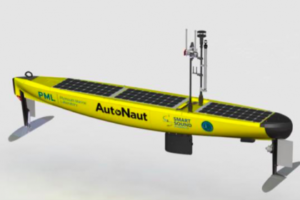Plymouth Marine Laboratory (PML) is set to launch a fleet of interconnected robotic technologies off the coast of Plymouth, which aims to act as a proving ground for marine technology.
In a first of its kind fleet, the Smart Sound Plymouth system covers more than 1,000km2 of ocean. The team behind it said this includes sheltered bays to hostile offshore waters, providing an area for developing and demonstrating both products and services for the marine sector.
Within the fleet is an eight-metre-tall autonomous data buoy, which will be deployed by PML with support from the European Regional Development Fund (ERDF), and features an autonomous water column profiling system.

The profiler will deliver high-resolution data to scientists working on the Western Channel Observatory. Where the previous buoy systems only measured in surface waters, the new profiled datasets will deliver an understanding of this changing area and its complex marine ecosystem.
The platform is built by Mobilis and provided through Hydrosphere UK.
Furthermore, the Smart Sound fleet also includes a five-metre uncrewed surface vessel, the PML Pioneer. Propelled by wave motion and powered by 300W solar panels, the PML Pioneer is one of only two in the UK.
Its integrated scientific payload includes chemical sensors as well as a photosynthetic efficiency and rate sensor.

Additionally, PML has also procured four autonomous underwater vehicles (AUVs) from ecoSUB robotics, with funding from NERC. The AUVs are designed to provide scientific data and is integrated together using acoustic underwater communications.
This means the AUVs will be able to perform multi-vehicle synchronised surveys with accurate underwater positioning and can communicate with the PML Pioneer.
James Fishwick, head of Smart Sound Plymouth, said: “This is an incredibly exciting time for PML and Smart Sound. The combination of the new data buoy and the autonomous vehicles will give us unrivalled capabilities for this type of ocean observation.
“It’s a great example of UK tech and innovation, a success story for Plymouth as a hub for marine research and an opportunity to showcase how we can monitor the environment in a net zero future.”
The fleet has received £1.8m investment from Smart Sound Connect, it aims to deliver a high-speed above water communications network across which the vessels and equipment will be able to communicate with each other. This advanced 5G private marine network will extend over one mile south of Plymouth Sound and cover the port of Plymouth.







